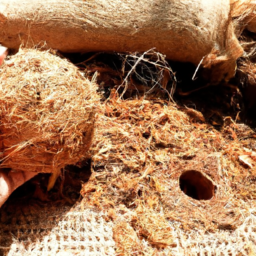How To Use Coconut Coir In Gardening
How To Use Coconut Coir In Gardening
How To Use Coconut Coir In Gardening
What is Coconut Coir?
Coconut coir, also commonly referred to as coco coir, is the fibrous material produced from the husk of a coconut. It is usually found in the form of a block or bricks, and when it is re-hydrated, it expands and fluffs up into a very lightweight material. It is a non-toxic, biodegradable substance that is often used as a soil amendment or potting medium for plants. It is also gaining popularity as a garden soil substitute, as its properties make it an excellent choice for reducing runoff, combating soil erosion, and improving the overall health of soils.
Benefits of Using Coconut Coir in Gardening
Coconut coir is a great soil amendment for gardeners, as it offers numerous benefits. Here are some of the ways coconut coir can improve gardening and soil health:
- It helps create better aeration and drainage, allowing for greater root growth.
- Coco Coir can help control pH levels in the soil, especially beneficial for acidic soils.
- It is an excellent source of organic material for composting and soil amendment.
- It also acts as a natural fertilizer, providing a slow release of important nutrients to plants.
- Coconut coir is a sterile material, so it can help reduce the risk of disease in plants.
- It is a great option for the environment, as it is a renewable and sustainable material.
How to Use Coconut Coir in Gardening
Coconut coir can be used in a variety of ways in your garden. Here are some of the most common ways it can improve your soil:
Amending Soil
Coconut coir can be added to existing soil to improve its texture and nutrient content. Coco coir should be mixed with the existing soil in a ratio of about 1 part coir to 4 parts soil. This ratio can be increased if the soil is particularly sandy, as coir can help to retain water and improve drainage in sandy soils.
Making Potting Soil
Coconut coir can be used to make a DIY potting soil. It can be mixed with compost and soil to create a nutrient-rich blend for container plants. It can also be used on its own as a potting mix, although it should be amended with other organic materials such as compost or worm castings to add nutrients to the mix.
Mulching
Coconut coir can be used as a mulch for your garden. It helps to retain moisture and reduce weed growth, while also adding organic material to the soil. In addition, coconut coir is much lighter than other mulching materials such as straw or wood chips, which makes it easier to spread in the garden. It can also be mixed with other mulching materials to create a more effective weed barrier and to increase water retention.
Insights
Coconut coir is an excellent soil amendment for gardening and can be used in a variety of ways. It helps improve soil structure and drainage, while also providing important nutrients to plants and reducing the risk of disease. It is also an environmentally friendly and sustainable material, making it an ideal choice for the eco-conscious gardener. With its numerous benefits, adding coconut coir to your gardening routine is an easy way to improve the health of your soil and your plants.

Previous Page
